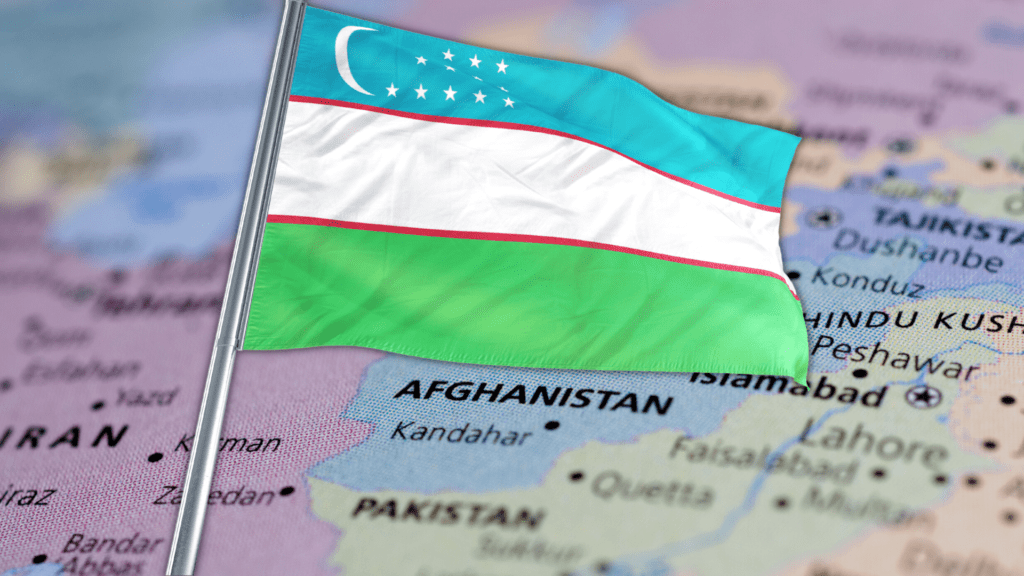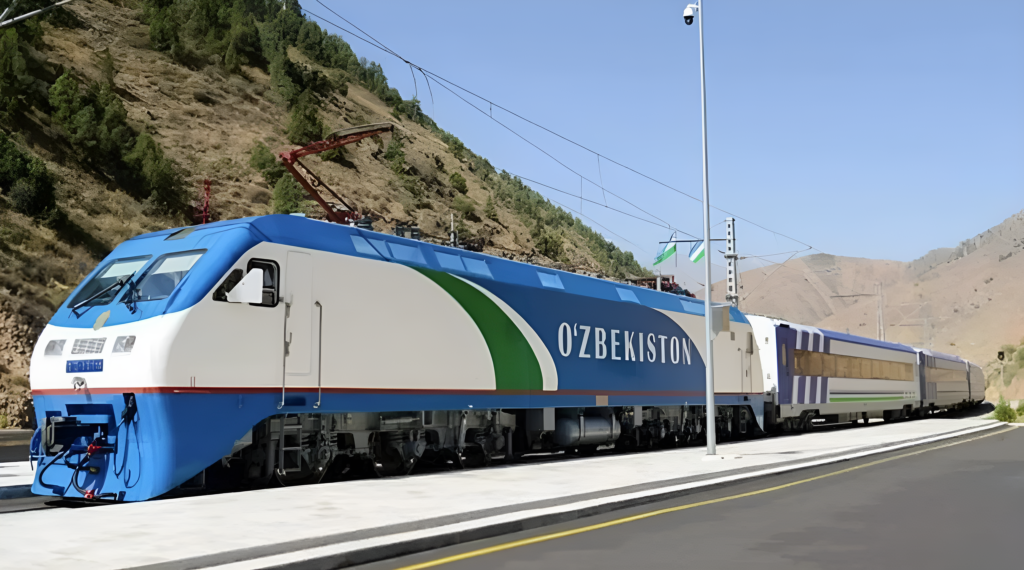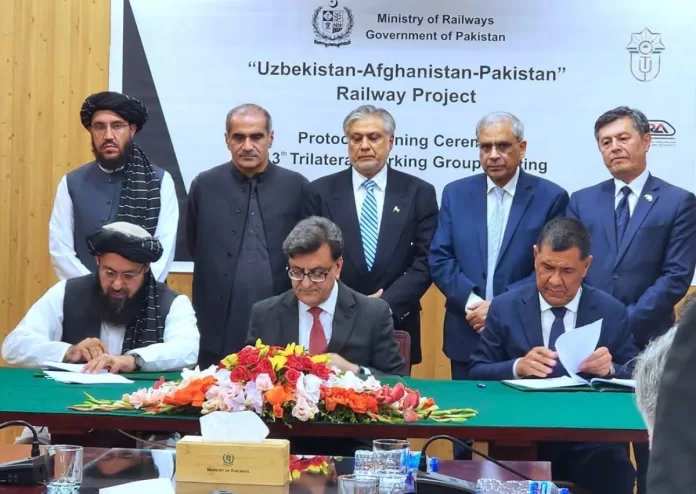The patterns of global power politics have started witnessing the growing cooperative ties between states at the trilateral and quadrilateral levels. This change has resulted in the emergence of various cooperative connections between territorially adjoining states beyond their traditional bilateral and multilateral collaborating frameworks. A recently held meeting among the government representatives of three neighboring states (Pakistan-Uzbekistan-Afghanistan) is an appropriate example for validating that the emerging tendencies of states regarding the development of their new alliances have started prevailing in the international system.
In this meeting, leaders of the three governments agreed to enhance their economic connectivity by promoting the values of peace and stability in Central and South Asian regions. The multidimensional discussions resulted in the signing of a tripartite agreement for building a joint rail network that could foster trading connection between the three countries.
The Uzbekistan-Afghanistan-Pakistan (UAP) railway project signed in July 2023 became a milestone development in the broader Asian region where the rising multileveled economic cooperations are becoming the gravitational points of contemporary global politics. The railroad agreement signed in Islamabad resulted in a vital communication link between the high-ranking formal railway officials of the three states. The role of the newly established Afghan government is significant because state officials from Kabul assured their support and constructive engagement for developing this tripartite trade transportation project.
The Islamabad-based Afghan diplomatic mission cleared the intention of the Afghan government to become an active part of this rail route project. This active role of Kabul reflected the positive commitments of the Afghan government to strengthening regional cooperation with other states generally and its neighboring states particularly.
The positive intention of the new Afghan government is a glimpse of ongoing updated and improved foreign relations of Kabul with surrounding states, in response to which the formal decision-making circles of the Pakistan and Uzbekistan governments have always remained strong-minded in ensuring peace and stability in Afghanistan.
A brief history of both states for supporting and promoting the Afghanistan-centric peace efforts is an appreciable reality that could be measured on several points. The post-US-withdrawal scenario in Afghanistan has witnessed Pakistan and Uzbekistan’s efforts to create a post-settlement peace process in Afghanistan.
The agreed framework for building a railway track is fundamentally designed to pass through Termiz (Uzbekistan), Mazar-i-Sharif (Afghanistan), and Kurram tribal district (Pakistan). The participating governments are expected to complete this rail network by the end of 2027, and it will enable the trains of three countries to carry goods weighing up to 15 million tons a year by 2030. The whole potential of this project depends on its completion because the political commitments among the three governments will need adequate allocation of funds and the implementation of the agreed project within the targeted time.

In response to these challenges of time and funding, the Pakistan, Afghanistan, and Uzbekistan governments appear to be highly determined to address all inevitable challenges associated with this connectivity plan. The three nations are committed to completing the UAP railway project within a defined time while accepting that completing this project will contribute positively to the existing frameworks of their regional trade and economic growth. This 760-kilometer railroad project is expected to reduce the delivery time of their trade, reducing the cost of business transportation by at least 40%. The estimates for reducing travel costs will prove an effective way of supporting the cross-cultural connections among the societies of the three countries.
Apart from reducing the existing transportation cost and travel time, the three nations will be able to increase their bilateral and regional trading incentives with the help of building transport corridors and constructing additional trading routes. This will also lead the three governments to improve and bring about changes to their existing custom procedures, parallel to removing unnecessary trade barriers in their vision of inter-regional economic integration.
The expanding cooperative interaction among three nations under this railroad project will also provide multifaceted trading opportunities to the business communities of three states, and it will create more investment avenues at the societal level. This will facilitate their respective business communities in constructing cross-cultural relations based on a common Muslim ideology, the foundations of which have always proved to be a strong connection between their respective societies. The alliance between the three neighboring countries is primarily an attempt of their respective governments to foster the trading connections between Central and South Asian regions.
Akin to the Afghan and Uzbek governments, the government of Pakistan has high ambitions for improving its economy through this rail route project. The Pakistani authorities have marked this rail route project as a game changer in the region that could support Pakistan’s government in overcoming its ongoing economic troubles.
Moreover, this interregional trading connectivity will be an opportunity for Pakistan as Pakistan’s trading connections will be also augmented with Russia and the five Central Asian Republics. The untapped potential of the Central Asian region will allow the Islamabad-based economic community explore various investment opportunities in the energy-rich Central Asian region.
Presently, the development of multilevel trade and increasing infrastructural development are the main focusing areas among the three states of the UAP railway project. The most attractive dimension of this agreement is the enhancement of people-to-people contact between three Muslim countries, which could be a great source of increasing Foreign Direct Investment.
It is pertinent to mention here that several factors, such as political dynamics, security situations, and changing scenarios of regional developments, could influence the success and progress of the trilateral Pakistan-Afghanistan-Uzbekistan trading collaboration. The most serious challenge will emerge from the Indian side because India’s anti-Pakistani obsession is bound to develop severe apprehensions for this project due to Pakistan’s growing significance in the international trading markets.
The contemporary trends of international trade have started focusing on Pakistan due to Islamabad’s decision to become an active partner of neighboring China in its greater global economic plans. In this way, Pakistan’s seaports are expected to become the leading business hubs in the future, and the Afghan and Uzbek governments will be able to get trading benefits from Pakistan under the shadows of their trilateral cooperation.

Additionally, the increasing business ties among the three nations will allow Islamabad to explore the Central Asian region for trading despite knowing that the Indian government is very active in creating strong collaborative relations with the five Central Asian Republics. Thus, it is more appropriate to maintain that the signing of the railroad project is an appreciable development for three neighboring nations, which could not be divorced from the future challenges. Based on this scenario, the efforts to address the prevalence of the mentioned challenges on the growing trilateral trading collaboration will define the success of this project in the future.





